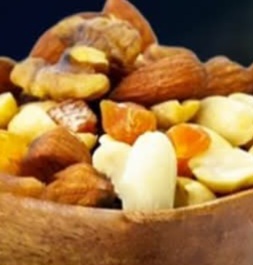In today’s fast-paced world, keeping your mind sharp is just as important as taking care of your body. Whether you’re managing a busy schedule, supporting your memory as you age, or simply aiming for better focus, the foods you eat can play a major role. While we often hear about puzzles and brain exercises, what we put on our plates may be just as important for long-term cognitive health.
Let’s explore five unexpected foods that research suggests may help support brain function—naturally and deliciously.Why Brain Health Deserves More AttentionYour brain is always on. Even when you sleep, it’s hard at work managing your heartbeat, breathing, memory storage, and much more. To do its job well, the brain needs high-quality fuel—nutrients that protect its cells and support communication between them.According to Harvard Health, diets rich in certain nutrients—like omega-3 fatty acids, antioxidants, and vitamins B, D, and E—may support cognitive function and healthy aging. That means the right foods could help you think more clearly, stay focused longer, and feel more mentally balanced.1. Blueberries – Nature’s Tiny Brain BoostersThese little berries pack a powerful punch when it comes to brain support. Rich in antioxidants called anthocyanins, blueberries may help protect brain cells from oxidative stress and inflammation.Why they matter:Studies suggest blueberries may help with memory in older adultsAntioxidants in blueberries may support communication between brain cellsThey’re easy to enjoy fresh, frozen, or blended into smoothiesOne 2012 study in Annals of Neurology even found that women who consumed more berries over time showed slower cognitive decline.Simple ways to enjoy blueberries:Toss into your morning oatmealBlend with yogurt for a healthy snackFreeze them for a refreshing treat2. Walnuts – The Brain-Shaped Nut for a ReasonEver notice how a walnut looks like a miniature brain? That’s more than a coincidence. Walnuts are one of the few nuts that contain a significant amount of ALA, a plant-based omega-3 fatty acid linked to brain health.Potential brain-supporting benefits include:Supporting mood and mental clarityPromoting communication between brain cellsProviding antioxidants and vitamin E, both linked to cognitive supportA 2015 study in The Journal of Nutrition, Health & Aging found that higher walnut intake was associated with better cognitive scores in adults.Ways to add more walnuts to your day:Sprinkle on saladsBlend into homemade pestoMix with raisins for a simple trail mix3. Beets – The Circulation Supporter Your Brain Might LoveBeets are often praised for their role in heart health, but they may also support your brain—especially as you age. Their natural nitrates may help increase blood flow to the brain, which is vital for mental sharpness.What makes beets special:Contain compounds that may support blood vessel healthMay improve oxygen delivery to the brainRich in folate, a B vitamin important for mental functionIn a 2017 study from The Journals of Gerontology, older adults who consumed beet juice before exercise showed increased brain activity in regions related to movement and cognition.Ideas for beet lovers:Roast and toss into grain bowlsJuice with carrots and gingerGrate raw into slaws or salads4. Pumpkin Seeds – Small but Packed with Brain NutrientsPumpkin seeds might be tiny, but they’re loaded with brain-friendly nutrients like magnesium, zinc, iron, and copper. Each of these minerals plays a unique role in maintaining mental function and clarity.Why they’re worth adding to your pantry:Magnesium may support learning and memoryZinc is linked to nerve signalingIron helps carry oxygen to the brainLow levels of these minerals—especially magnesium and iron—have been linked to foggy thinking and low energy.Tasty ways to use pumpkin seeds:Add to granola or yogurtUse as a crunchy soup toppingMix with dark chocolate chips for a snack5. Dark Chocolate – Yes, Really!Good news: a little dark chocolate might support your brain, too. Rich in flavonoids, caffeine, and antioxidants, dark chocolate may enhance brain plasticity and promote better learning and memory.Keep in mind:Choose chocolate with at least 70% cocoa contentA small square or two is plenty—more isn’t always betterThe benefits come from cocoa, not sugar or milk fatA 2017 review in Frontiers in Nutrition noted that cocoa flavonoids may have a positive impact on memory, mood, and even reaction time.Smart ways to enjoy it:Melt over fruit slicesStir into oatmeal or smoothiesEat a small piece after lunch to avoid the afternoon slumpSimple Tips to Support Your Brain Every DayBeyond adding brain-friendly foods, certain habits can help you make the most of your nutrition:Daily tips for better cognitive support:Stay hydrated – Dehydration can impact mood and focus.Prioritize sleep – Your brain resets and clears waste during deep sleep.Keep moving – Physical activity boosts blood flow and brain function.Cut back on ultra-processed foods – These may increase inflammation.Include colorful fruits and vegetables – Variety ensures a wider range of nutrients.Final Thoughts: Small Changes, Big ImpactYou don’t need to completely overhaul your diet to support your brain. Simple changes—like swapping chips for walnuts, adding berries to your breakfast, or sipping beet juice before a walk—can make a meaningful difference over time.Brain health isn’t about one “superfood.” It’s about nourishing your body consistently with wholesome, nutrient-rich choices.Which of these foods have you tried? Comment your favorite below—or tag a friend who could use a brain boost!Looking for more wellness tips? Explore our site for practical, everyday ways to support your health naturally.*Disclaimer: This article is for informational purposes only and does not substitute professional medical advice. Consult your doctor before making health changes, especially if you have any medical conditions or take medication.Eat Smarter: 5 Brain-Boosting Foods You’d Never Expect
